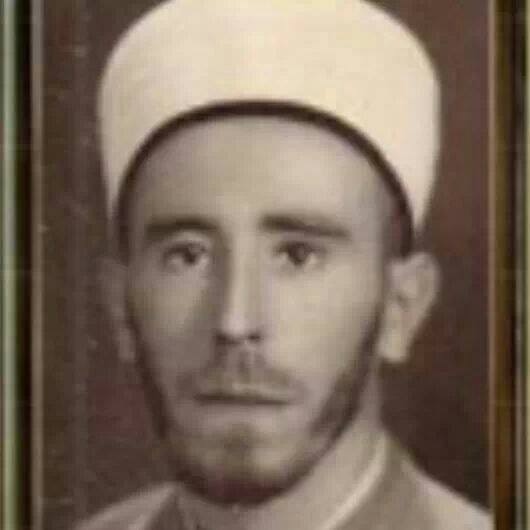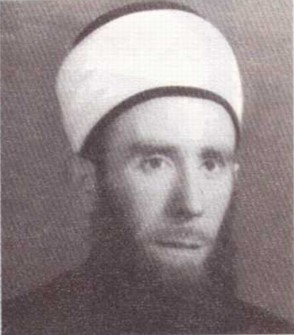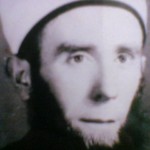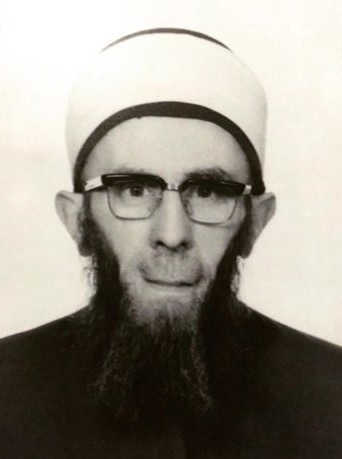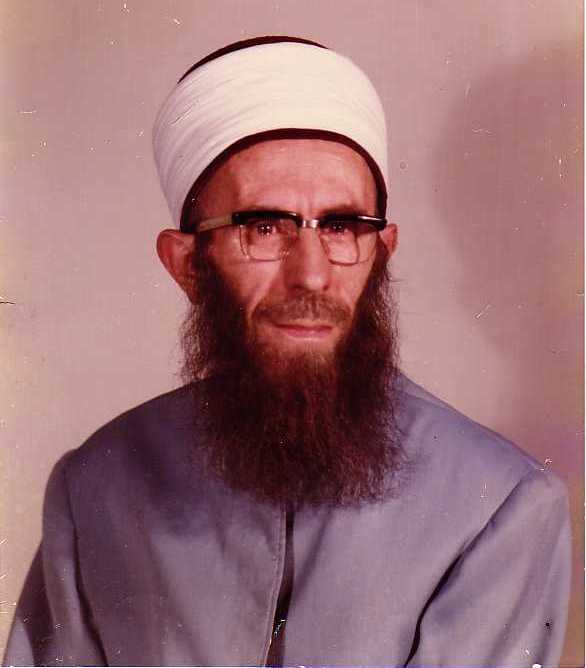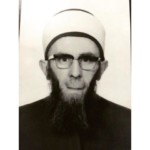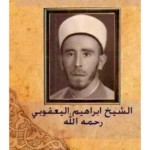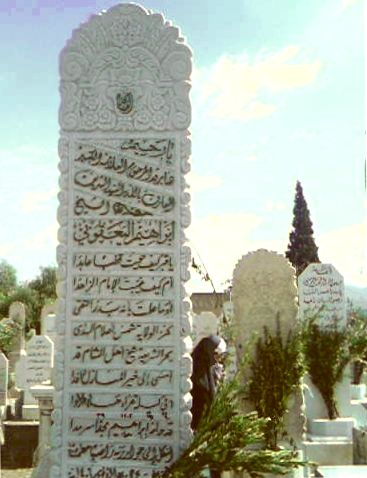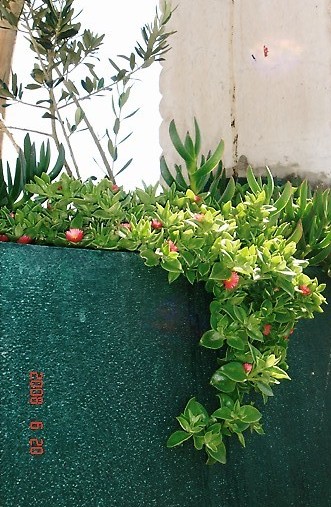Bio: Sh. Ibrahim al-Yaqoubi
Sayyidi Shaykh Ibrahim al-Yaqoubi al-Hasani al-Idrisi
الشيخ السيد إبراهيم اليعقوبي الحسني
d. 1406 H. / 1985 CE in Damascus
qaddasa Allah sirrahu
﷽
He is the khalifa of this father, Shaykh Ismail al-Yaqoubi, in the Shadhili silsila, and he was succeeded by his son, Shaykh Muhammad al-Yaqoubi.
Bio
 Biography of Sh Ibrahim al-Yaqubi
Biography of Sh Ibrahim al-Yaqubi
Adapted from Nathar al-Jawahir wal-Durar
Early Life and Seeking of Knowledge
Memory
Teaching
Works
Personal traits
Passing
His lineage
Shaykh Ibrahim al-Ya`qoubi (d. 1985/1406 H.) descends from a scholarly family whose lineage goes back to the Prophet, salla Allahu ‘alayhi sallam, through his grandson Sayyiduna al-Hasan, radiya Allahu ‘anhu. His lineage goes back to Mawlay Idris al-Anwar who built the city of Fes. Mawlay Idris’ lineage is as follows: he is the son of Mawlay Idris the Great; who is the son of Sayyiduna Abdullah al-Kamil; who is the son of Sayyiduna al-Hasan, the Second; who is the son of Sayyiduna al-Hasan, radiya Allah ‘anhu; who is the grandson of the Prophet, salla Allahu ‘alayhi wa sallam.
Early Life and Seeking of Knowledge
Sh. Ibrahim was born in Damascus on the night of Eid al-Adha in the year 1343 Hijri and was raised under the supervision of his father who taught him whilst he was still young the fundamentals of Aqidah and the Quran in the recitation of Warsh.
He began the study of various sciences firstly in the ‘Maktab’ of Sh. Mustafa al-Jazairi, then he was moved after some months by his father to the ‘Maktab’ of Sh. Muhammad Ali al-Hijazi al-Kaylani where he remained for around six years the duration of which he memorized most of the Quran.
He studied with the spiritual guide Sh. Muhammad al-Hashimi, the Sheikh of the Shadhili order, who resided nearby to the home of Sh. Ibrahims father. Sh. Ibrahim would accompany Sh. al-Hashimi to the Jami al-Baridi, Jami Nur al-Dinal-Shahid and the Madrassa al-Shamiyah wherein would take place circles of dhikr and learning. He memorized with him during this time ‘Nadhm Aqidah Ahl al-Sunnah’ and a portion of ‘Diwan al-Mustaghnami’. He studied with him the ‘Sharh al-Risalah’ of al-Sharnubi and al-Zarqani, and ‘Bulghah al-Salik’ in Maliki fiqh, ‘Sharh Nadhm Aqidah Ahl al-Sunnah’, ‘Miftah al-Jannah’ and ‘Risalah al-Qushayriyyah’ which took place at private lessons in his home.
He studied with him in the Umayyad mosque and other places the commentary of ‘Ibn Ashir’
by Sh. Muhammad bin Yusuf al-Kafi called ‘Al-Murshid al-Mueen’, ‘Tafsir Ibn Ajibah’, ‘Sharh al-Hikam’ of Ibn Ajibah, ‘Sharh al-Bayquniyyah’ of al-Zarqani, ‘Awarif al-Maarif’ of al-Suhrawardi, ‘Nawadir al-Usul’, ‘Al-Futuhat al-Makkiyah’, ‘Al-Hikam al-Ataiyah’ and the two Sahihs.
He was granted a general ijazah by him on the 24th of Shawwal 1379 Hijri in the rational and transmitted sciences, aswell as the litanies of the Shadhili order.
He attended with his father whilst young the lessons of the Muhaddith Sh. Muhammad Badr al-Din al-Hasani, aswell as regularly visiting and benefitting from the lessons of his uncle Sh. Muhammad al-Sharif al-Yaqubi, whose public lessons he attended in the prayer niche (mihrab) of the Maliki’s in the Umayyad mosque and his home.
He also studied with his uncle Sh. Muhammad al-Arabi al-Yaqubi in the prayer niche of the Malikis in the Umayyad mosque.
He studied the fourth volume of the work ‘Al-Durus al-Nahwiyah’ of Hisni Nasif with Sh. Muhammad Ali al-Qattan and kept the company of Sh. Hussein al-Baghjati from whom he benefitted from in the sciences of calligraphy, recitation (tajwid) and Prophetic biography (sirah).
He attended during this period of time the public lessons which would take place in the Sinaniyyah mosque by Sh. Ali al-Daqr, Sh. Hashim al-Khatib, Sh. Muhammad Shakir al-Misri better known as al-Himsi, Sh. Abd al-Majid al-Tarabishi with whom he studied ‘Multaqa al Abhur’ and ‘Maraqi al-Falah’. He studied with Sh. Abd al-Hamid al-Qabuni ‘Hidayah al-Mustafid’ and the text of ‘Ghayah wa al-Taqrib’.
He also studied with Sh. Abd al-Qadir al-Iskandari and Sh. Muhammad Barakat.
His father Sh. Ismail was his first spiritual guide and the most important of his teachers during his life. He took from the Shadhili path and benefitted from his instructions and training. He likewise took from him the Qadiri and Khalwati orders aswell, and was authorised in a number of them by him.
He benefitted from the lessons of Sh. Muhammad al-Makki al-Kattani, he studied with him in his home. He read with him the ‘Al-Arbain al-Ajluniyyah’, the ‘Sharh al-Bukhari’ of al-Qastallani, ‘Lataif al-Minan’ and ‘Ruh al-Quds’. He took from him the Shadhili Qadiri path. He also narrated from him the pattern chained narrations (musalsal) of mercy (rahmah), interlacing fingers, shaking hands and the hadith of Muadh Ibn Jabal. He was granted a lengthy ijazah by him in his handwriting in on the 24th of Shaban 1378.
He took from Sh. Muhammad al-Arabi al-Azuzi in Damascus when he came from Beirut, and
hosted him a number of times. He read with him the ‘Al-Arabin al-Ajluniyyah’ in one sitting, a number of treatise on some sciences of tasawwuf and was granted a general ijazah by him dated the 8th of Shawwal 1381.
He attended the lessons of Sh. Ahmad bin Muhammad bin Yallas al-Tilmisani at his home. He read with him ‘Subul al-Salam Sharh Bulugh al-Maram’, ‘Sharh al-Hikam’ of Ibn Ajibah, ‘Taysir al-Wusul ila Jami al-Usul’, ‘Hashiyah al-Arusi ala Sharh al-Risalah al-Qushayriyyah, ‘Sunan Ibn Majah’, ‘Idah al-Maqsud fi Mana Wahdah al-Wujud’ of Sh. Abd al-Ghani al-Nabulsi. He likewise attended the lessons which would take place in peoples homes in which he read ‘Dalil al-Falihin’ and ‘Al-Futuhat al-Rabbaniyyah’. He attended in his Zawiyah al-Samadiyah many of his circles of dhikr, and studied the ‘Hashiyah al-Bajuri’ on the Shamail of al-Tirmidhi and ‘Ghaliyah al-Mawaiz’. From him he took the Shadhili way and was granted an ijazah verbally.
He studied with Sh. Muhammad Salih al-Farfur ‘Tafsir al-Nasafi’ from the beginning up to Yasin. ‘Sharh Ibn Aqil’ on the Alfiyyah of Ibn Malik, ‘Sharh al-Manar’ of Ibn Malik, ‘Sharh al-Sirajiyyah’, ‘Jawahir al-Balaghah’, ‘Asrar al-Balaghah’, ‘Al-Kamil’ of al-Mubrad, ‘Tadrib al-Rawi’, ‘Risalah al-Qushayriyyah’ and attended his morning lessons on the ‘Hashiyah Ibn Abidin’, ‘Sahih al-Tirmidhi’, ‘Al-Minan al-Kubra’, ‘Sharh al-Hikam’ of Ibn Ajibah, ‘Al-Yawaqit wal-Jawahir’ and around 8 volumes from ‘Umdah al-Qari’ of al-Aini. In addition he attended his evening lessons on ‘Sharh al-Qutb al-Razi ala al-Shamsiyyah’ on logic (mantiq) by Najm al-Din al-Katibi, ‘Hashiyah al-Adawi ala Khulasah al-Hisab’ of al-Amili, ‘Hashiyah al-Bajuri ala al-Jawharah’ a number of times, ‘Sharh al-Musayarah’ of Ibn Abi Sharif. He attended after after the Asr prayer in his home the ‘Tafsir al-Kashaf’ of al-Zamakhshari and ‘Dalail al-Ijaz’ and was granted a written ijazah by him.
He studied with Sh. Abd al-Wahab al-Hafidh better known as Dibs Wazit the text ‘Multaqa al-Abhur’ in the Umayyad mosque, and attended his public lessons in the month of Ramadan. He sought an ijazah from him and was authorised with one verbally a number of times and promised a written one, but passed away before he could write it. Sh. Abd al-Wahab would say: If you wish to ask regarding a ruling in the hanafi madhab and do not find me, then ask Sh. Ibrahim al-Yaqubi in the prayer niche (mihrab) of the Malikis in the Jami al-Umawi’.
He visited Sh. Ahmad al-Harun a number of times, was given ijazah in his specific litanies.
He attended some of Sh. Muhammad Saeed al-Burhani’s lessons in the Umayyad mosque for the books ‘Al-Minan al-Kubra’ and ‘Al-Warif wal Maarif’ and took the the Shadhili path from him, and there was between both of them a close relationship.
He attended some of Sh. Muhammad Abi al-Khair al-Maydanis lessons in Dar al-Hadith for the book ‘Sharh al-Mawahib al-Laduniyyah’ of al-Zarqani, and heard from him the hadith of mercy, and took the Naqshbandi path from him. He read to him the beginning of ‘Al-Jami al-Saghir’ of al-Suyuti and was given a general ijazah by him and was promised a written one.
He studied with Sh. Nuh al-Albani at him home the ‘Risalah al-Sibt al-Mardini fi Amal bi al-Rub al-Mujib’.
He read to the Quran recitor Sh. Muhammad Sadiq Alwan the whole Quran, and read the ‘Sharh al-Jazariyyah’ and ‘Manar al-Huda’ of al-Ashmuni to him.
He studied with Sh. Muhammad Abi Yusr Abidin in a private gathering some of the treatise of Ibn Abidin and who said: My successor in fiqh and usul is Sh. Ibrahim al-Yaqubi.
He obtained numerous ijazahs other than the ones mentioned, amongst them being the ijazah from Sh. Abd al-Karim al-Saqli, Sh. Zayn al-Abidin al-Tunisi and Sh. Ali al-Boudilimi.
Memory
He memorized a large number of texts, their sum total exceeding 25,000 lines of poetry. He would cite much of them during his lessons, such as the ‘Al-Kafiyah al-Shafiyah’ of Ibn Malik and his ‘Al-Alfiyyah’. Likewise ‘Ghayah al-Maani’ of al-Baytushi, ‘Nadhm Mughni al-Labib’, ‘Lamiyah al-Afal’, ‘Muthalathath Qatrab’, ‘Nadhm Mukhtasar al-Manar’, Al-Kawakabiyah’ in Usul, ‘Maunah al-Rahman’ in Hanafi fiqh, ‘Matn Ibn Ashir’, ‘Tuhfah al-Hukkam’ better known as ‘Al-Asimiyyah’ in Maliki fiqh.
He memorized ‘Matn al-Zubad’, ‘Nadhm Matn Ghayah wal-Taqrib’ in Shafi fiqh.
He memorized ‘Al-Jawharah’, ‘Al-Shaybaniyyah’ and ‘Bad al-Amali’ in Tawhid.
In hadith terminology he memorized ‘Al-Bayquniyyah’, ‘Nadhm Nukhbah al-Fikr’ and close to half of al-Iraqi’s ‘Al-Alfiyyah’.
In Balaghah he memorized ‘Al-Jawhar al-Maknun’ of al-Akhdari and in logic (mantiq) ‘Al-Sullam’, ‘Nadhm al-Shamsiyah’ and ‘Nadh Adaab al-Bahth’ of al-Marsafi.
In inhertiance law he memorized ‘Al-Rahabiyyah’ and ‘Lamiyyah al-Jabari’, and in recitation (tajwid) ‘Al-Jazariyyah’ and ‘Tuhfah al-Atfal’.
In literature he memorized the ‘Diwan al-Hamasah’ and portions of ‘Al-Mufadalliyat’, ‘Al-Muallaqat al-Ashr’ and many of the well known odes (qasaid).
From the texts written as prose he memorized ‘Al-Risalah’and ‘Matn al-Khalil’ in Maliki fiqh. In grammar ‘Qatar al-Nada’ and ‘Shudhur al-Dhahab’. Likewise ‘Al-Sanusiyyah’, ‘Matn Nur al-Idah’, ‘Al-Manar’, ‘Aqidah al-Sheikh Arsalan’ and ‘Al-Hikam al-Ataiyyah’.
Teaching
He began teaching before reaching the age of 20 in the Jami al-Sinan Pasha. And was appointed as a teacher in the Jami Darwish Pasha in the year 1376 Hijri. Before this in 1373 he was appointed Imam in Jami al-Zaytuna and then the Jami al-Baridi and then the Umayyad mosque in the prayer niche (mihrab) of the Malikis and then the Hanafis, until the year 1390 Hijri.
He was appointed a teacher linked to the fatwa administration in the year 1378 Hijri.
He taught in the Jami al-Uthman, Shariah Secondary school, Mahad Fath al-Islami, Mahad Isaf Tullab Ulum al-Shariyyah, Madrassa al-Ghazali lil Ahdath and Madrassa Sijn Qilah Dimashq.
He performed the obligatory Hajj in the year 1392 via the land route, and this was his only Hajj.
Knowledge
Sh. Ibrahim al-Yaqubi was an expert in a number of the Islamic sciences, and firmly grounded in both the Hanafi and Maliki schools, both of which he taught. It is said that he had memorized the ‘Hashiyah Ibn Abidin’.
His lessons on Usul where those of a Mujtahid due to his vast knowledge the principles of the madhahib and their evidences. He taught ‘Al-Talwih’ a number of times, and ‘Hawashi al-Mirat’ in Usul, also ‘Al-Muwafiqat’ of al-Shatibi a number fo times and the ‘Mustasfa’ of al-Ghazali amongst other works.
His expertise in the Arabic language was evident from his teaching of ‘Mughni al-Labib’ of Ibn Hisham a number of times, likewise ‘Sharh al-Rida ala al-Kafiyah’ of Ibn al-Hajib and the commentaries of ‘Al-Alfiyah and the ‘Kitab al-Sibaway’.
.
Sh. Ibrahim also taught logic and philosophy, he taught ‘Shuruh al-Shamsiyah’, ‘Sharh al-Tahdhib’, ‘Al-Basair al-Nasiriyah’, ‘Sharh al-Maqawulat’, ‘Sharh al-Isharat’ of al-Tusi, ‘Shuruh al-Sullam’ of al-Isaghawji.
Personal Traits
He possessed an illuminating face which attracted people towards him. The humility of the scholars was evident on him, he was softly spoken and would not distinguish himself from others. He would pay his full attention to those who visited him, they would enjoy his conversation and he would not tire of them nor their questions. He would answer them clearly and in detail in the manner of a precise learned scholar. Despite this he loved solitude, he said: If it was not for knowledge and seeking it I would not have met any of the people’. Also saying that the most beloved moments to him were in a lesson where he would taste the enjoyment of the knowledge and time spent in the rememberance of Allah.
He did not seek fame nor did desire to gain it, and did not teach for worldly gain. If he taught and gave a sermon would do so seeking the pleasure of is Lord. He lived a life full of modesty and suffered hardship as he had made it all an endowment to knowledge and serving others.
He bore with patience the personal difficulties he experienced and was content with that which Allah had apportioned for him. One of his young sons died on the morning of a lesson which had been arranged in his home. He welcomed the students, taught them the lesson from ‘Al-Risalah al-Qushayriyyah’ as was his habit and treated them as a guest should be treated. When he finished the lesson he informed them of the death of his son.
He would make much rememberance of Allah in solitude and would busy himself in spiritual retreats. He would guide and train those around him with his state and actions. To him real tasawwuf was not empty words and hollow zikr, therefore he would say: Tasawwuf is acting on knowledge, Tasawwuf is good character (akhlaq), whomsoever surpasses you in akhlaq has surpassed you in tasawwuf…
He would speak for a number of hours in a clear precise manner. His way of explaining was such that he would take the most complex of issues and would present them in way which they were clearly understood, this is why his lessons were beloved to people.
He kept up to date with current schools of thought and matters which were of concern to those in the Muslim world. He would not discuss any school of thought without first studying it. He studied the Torah and Bible, the discussions and books authored in critique of other religions. He would keep up to date with the publishing of new books and new ideas.
His teachers with whom he studied honoured, loved and respected him. And would ask his view on difficult matters.
Passing Away
Sh. Ibrahim had informed his family of his death 6 months before his passing away, and he then informed them again 3 days before his death that he would be meeting his Lord on the night before the day of Jumah. He instructed them to pray over him on the Asr of Friday and asked to be buried next to his mother, and that they not do anything against the sunnah nor anything unlawful during the preparation and performance of his funeral and burial. He also asked his debts to be paid and the trusts left with him to be returned to their owners.
Sh. Ibrahim al-Yaqubi passed away on the night before the day of Jumah on the 26th of Rabi al-Awwal in the year 1406 Hijri. His eldest son Sh. Muhammad Abu al-Huda lead his funeral prayer in the grand Umayyad mosque. A large funeral procession followed respectfully to the cemetery of Bab al-Saghir where he was lowered in to his grave by his student Dr Muhammad Abd al-Latif Farfur.
A few weeks after his passing away a gathering was held in rememberance of him in the Jami al-Uthman in Damascus which was attended by numerous people of knowledge from cities all over Syria.
May Allah (the Exalted) have mercy on Sh. Ibrahim al-Yaqubi, all the scholars mentioned in this article, Sh. Ibrahims students and all of the Muslims.
_____________________________
Adapted from ‘Nathar al-Jawahir wal-Durar’
Reproduced by Courtesy of Dar al-Hadith blog
See also thefinalbrick.blogspot
What Ulama said
What the `ulama said about Sheikh Ibrahim al-Ya`qubi qaddasa Allah sirrahu
Extracted from:
Biography written by `Ali ibn Muhamad Amin Qasibati at Ma`had al-Fath, 2004
His teacher Sheikh Muhammad `Arabi al-`Azuzi, Chief of Fatwa in Libanon, used to write letters to him, in which he addressed him wordings such as:
and:
Sheikh Muhammad al-Hashimi referred to him in his ijaza to him as:
His teacher Sheikh Abul Yusr `Abidin said:
Sheikh `Abd al-Wahhab al-Hafizh (known as “Dibs wa Zayt”, and “The younger Abu Hanifa”) said about him:
Sheikh Adib al-Kilas said about him:
Sheikh Ahmad Samadiyya said about him:
Sheikh al-Fatih al-Kettani said about him:
Sheikh Sabhi al-`Aduli said about him:
Sheikh `Abd al-Wakil al-Jakhdar said about him:
Notes:
[1] – Ref: bmk notes on Qawa`id al-tasawwuf, Damascus 2005
عربي
From ulamaofdamascus.wordpress.com
الشيخ إبراهيم اليعقوبي رحمه الله
هو إبراهيم بن إسماعيل بن محمد الحسن اليعقوبي الحسني. جزائري الأصل هاجر جدّه محمد الحسن إلى دمشق مع بعض المشايخ سنة 1263هـ. وُلِدَ رحمه الله بدمشق ليلة الأضحى سنة 1343 هـ وقد أخذ العلم عن مشايخ كثيرين: منهم وقد كان أولهم والده الشيخ إسماعيل: فقد لقنه وهو صغير مبادىء العقيدة والقرآن الكريم, والشيخ مصطفى الجزائري الذي لقنه مبادىء العلوم, والشيخ محمد علي الحجازي الذي حفظ عليه أكثر القرآن الكريم, والمرشد الشيخ محمد الهاشمي الذي أجازه بخطه إجازة عامة, والشيخ محمد المكّي الكتّاني الذي روى من طريقه الأحاديث المسلسلة كحديث الرحمة والمشابكة والمصافحة وحديث معاذ بن جبل: -والله إني لأحبك-, وأجازه بخطه مرتين.
كما قرأ على الشيخ محمد صالح الفرفور مؤسس معهد الفتح الإسلامي قرأ عليه علوماً كثيرة مثل: شرح ابن عقيل على ألفية ابن مالك, وجواهر البلاغة, وعلىالشيخ عبد الوهاب الحافظ الشهير بدبس وزيت, ولقد أجازه شفهياً مرات, وتوفي الأخير رحمه الله قبل أن يجيز الشيخ كتابياً, وكان الشيخ عبد الوهاب يقول: إذا أردتم أن تسألوا عن حكم في المذهب الحنفي ولم تجدوني فاسألوا الشيخ ابراهيم اليعقوبي في محراب المالكية بالجامع الأموي, وعلى الشيخ محمد أبي اليسر عابدين قرأ بعض رسائل ابن عابدين وقال: إن خليفتي في الفقه والأصول الشيخ إبراهيم اليعقوبي.
حفظ متوناً كثيرة زاد مجموعها على خمسة وعشرين ألف بيت منها: الألفية لابن مالك الجوهرة الوحيدة في التوحيد, البيقونية في المصطلح, الرحبية في الفرائض. وكان قد بدأ بالتدريس دون العشرين في جامع سنان باشا, ودرّس في معهد الفتح الإسلامي وغيره , شغل إمامة المالكية ثم الحنفية بالجامع الأموي, ودرّس وخطب مدة تزيد على خمسة وثلاثين عاما حجّ الفرض مرة واحدة سنة 1392هـ عن طريق البر, ولم يحج سواها.
وقد ترك عدداً كثيراً من الكتب والمؤلفات منها:العقيدة الإسلامية, الفرائد الحسان في عقائد أهل الإيمان وهما مطبوعان, النور الفائض في علم الميراث والفرائض, ومنظومة في آداب البحث والمناظرة. كما حقق مجموعة من المخطوطات منها: الحِكَم العطائية, هدية ابنالعماد في أحكام الصلاة, الأنوار في شمائل النبي المختار للبغوي, قواعد التصوف للشيخ أحمد زرّوق ومن مخطوطاته الكوكب الوضاء في عقيدة أهل السنة الغراء, معيار الأفكار وميزان العقول والأنظار في المنطق, التذكرة وهي ثبت في أسانيده وشيوخه وله ديوان شعر, بالإضافة إلى أبحاث نشرت في بعض الدوريات ولمحمد عبد اللطيف فرفور رسالة صفحات مشرقات وظلال وارفات من حياة العلامة الشيخ إبراهيم اليعقوبي
كان رحمه الله يجذب الناس إليه ويؤلّفهم نحوه, عليه تواضع العلماء وسَمْتهم, ليّن الحديث, ولا يميز نفسه عن الآخرين, يقبل عليهم بكلّيّته إذا زاروه ويمتّعهم بأحاديثه العذبة, ولا يملّ منهم, ولا يتململ من أسئلتهم التي يجيب عليها بوضوح وتفصيل جواب العالم المتقن الشافي. ومع هذا فهو يحبّ العزلة ويميل إليها, ويقول: لولا العلم وطلب العلم, لما قابلت من الناس أحداً. أحبّ الأوقات إليه ساعتان, ساعة درس يتلذّذ فيها بالعلم, وساعة نجوى يقضيها بذكر الله تعالى. كان شيوخه الذين درس عليهم يجلّونه ويحترمونه ويحبونه ويسألونه رأيه في بعض المعضلات التي تشكُل عليهم. كان صاحب الترجمة مصاباً بضيق الصّمّام التاجي نتيجة الإرهاق والتعب. ولما زاد مرضه بقي في داره متفرّغاً للتأليف والإفتاء.
وقبل وفاته بأيام ازداد مرضه فنُقِلَ إلى المستشفى وتوفي ليلة الجمعة في 26 ربيع الأول عام 1406هـ, في المستشفى حيث غسّله أبناؤه وصلى عليه ولده الأكبر العلامة سيدي محمّد أبو الهدى في الجامع الأموي, وشُيِّع في جنازة حافلة إلى مقبرة باب الصغير.
أقول أنا عبدالعزيز بن علال الحسني الدمشقي الجزائري قدألبسني شيخنا محمدأبو الهدى اليعقوبي عمامة والده في بيته بدمشق.
Works
– Qabs Min Siyar al-Nabawiyyah
– Al-Jami´ li Shawahid Ulum al-Arabiyyah (not complete)
– Al-Nur al-Faaid fi Ulum al-Mirath wal-Faraid
– Miyar al-Afkar wa Mizan al-Uqul wal-Anzar on logic (mantiq)
– Risalah al-Faraid al-Hisan fi Aqaid al-Iman View PDF arabic/french
– Al-Kawkab al-Wada fi Aqidah Ahl al-Sunnah al-Gharra (poem)
– A commentary of Bulugh al-Maram (not completed)
– A poem on Adab al-Bahth wal-Munazarah
– Shifa al-Tabarih wal-Adwa fi Hukm al-Tashrih Naql al-Ada – on organ transplant
– Al-Tadhkirah – Collection of his chains of transmission (thabat)
– Taqwim al-Nafs – Lectures on Islamic character
– Qalaid al-Faraid – on literature
– Al-Muhadarat fi Tafsir al-Quran al-Karim – Lessons he dictated on tafsir in Jami al-Uthman
– Mu´jam al-Shuyukh wal-Aqran
– Al-Aqidah al-Islamiyyah – A text on belief which he authored for students of the shariah secondary school in Damascus which he also taught them
– A versified version of Nur al-Idah (not complete) in Hanafi fiqh
– An abridgement of Sunan Ibn Majah
– Diwan Shi’r
He left behind a number of treatise on the sciences of: Balaghah, al-urud, al-Wad’, Ilghaz and Usul al-Fiqh. He also has notes on a number of works.
Critical Editions
He edited a number of manuscripts, amongst them being:
-Qawaid al-Tasawwuf of Sh. Ahmad Zarruq
-Al-Hikam al-Ataiyyah which was published fpr the first time in in 1384
-Al-Anwar fi Shamail al-Nabi al-Mukhtar of al-Baghawi
-Al-Muntakhab fi Usul al-Madhab by al-Akhsekti
-Badi al-Nadham fi Usul al-Fiqh of Ibn Saati (not complete)
-Hadiyyah Ibn Imad fi Ahkam al-Salah
-Al-Haiyah al-Sanniyah fo al-Haiyyah al-Sunniyah of al-Suyuti
-Al-Fath al-Rahmani fi Fatawa al-Sayyid Thabit Abi al-Maani (second volume).
Miracles
Photos
Burial place
Refs
Biography by Arfan Shah (marifa.net, pdf}
Al-Fara’id al-hisan (arabic-french, pdf)
Interview with his son Sheikh Muhammad al-Yaqoubi in “يحدثون عن آبائهم” (arabic, pdf)
Français
Shaykh Ibrahim al-Yaqoubi al-Hasani
Shaykh Ibrahim al-Yaqoubi était l’un des plus grands savants que la Syrie ait connus ces cinquante dernières années. Il succéda au Shaykh Muhammad al-Makki al-Kattani dans la fonction de Mufti malikite du pays. Il fut Imam et enseignant à la grande mosquée des Omeyyades. Il est le khalifa de son père, Shaykh Ismail al-Yaqoubi, dans la chaîne de transmission shadhilite.
Biographie de Shaykh Ibrahim al-Yaqoubi
Adaptation de Nathar al-Jawahir wal-Durar
Son ascendance
Shaykh Ibrahim al-Yaqoubi (1985/1406 H) est issu d’une famille de savants dont l’ascendance remonte au Prophète Muhammad ﷺ, par son petit-fils Sayyiduna al-Hasan, radiya Allahu `anhu.
Son ascendance remonte à Mawlay Idris al-Anwar qui construisit la ville de Fès.
L’ascendance de Mawlay Idris est comme suit : il est le fils de Mawlay Idris le Grand ; qui est le fils de Sayyiduna `Abd Allah al-Kamil ; qui est le fils de Sayyiduna al-Hasan le Second ; qui est le fils de Sayyiduna al-Hasan, radiya Allah ‘anhu ; qui est le petit-fils du Prophète Muhammad ﷺ.
Jeunesse et quête de science
Shaykh Ibrahim al-Yaqoubi est né à Damas dans la nuit de l’Aïd al-Adha en l’an 1343 de l’hégire (1922 du calendrier grégorien). Il a été élevé par son père qui lui enseigna dès son plus jeune âge les fondamentaux de la croyance et la récitation du Saint Coran selon la lecture Warsh.
Il débuta son apprentissage des sciences religieuses auprès de Shaykh Mustafa al-Jaza’iri. Après quelques mois, son père le confia au Shaykh Muhammad `Ali al-Hijazi al-Kaylani auprès de qui il restera près de 6 ans. Durant cette période, il mémorisa la majeure partie du Saint Coran.
Il étudia auprès du guide spirituel Shaykh Muhammad al-Hashimi, le Shaykh de la voie Shadhili. Shaykh Muhammad al-Hashimi vivait près de la maison du père de Shaykh Ibrahim al-Yaqoubi. Shaykh Ibrahim accompagnait Shaykh al-Hashimi au Jami` al-Baridi, au Jami` Nur al-Din al-Shahid et à la Madrassa al-Shamiyah où se tenaient des cercles d’évocation et d’apprentissage. Il mémorisa auprès de lui ‘Nadhm `Aqidah Ahl al-Sunnah’, une partie de ‘Diwan al-Mustaghnami’ et il étudia ‘Sharh al-Risalah’ d’al-Sharnubi et al-Zarqani, et ‘Bulghah al-Salik’ dans le fiqh malikite, ‘Sharh Nadhm Aqidah Ahl al-Sunnah’, ‘Miftah al-Jannah’ et ‘Risalah al-Qushayriyyah’ dans le cadre de cours privés qui se tenaient chez lui.
Il étudia avec lui, à la mosquée des Omeyyades et dans d’autres lieux, le commentaire d’Ibn `Ashir par Shaykh Muhammad bin Yusuf al-Kafi aussi connu sous le nom de ‘Al-Murshid al-Mu`een’, le ‘Tafsir Ibn `Ajiba’, le ‘Sharh al-Hikam’ d’Ibn `Ajiba, le ‘Sharh al-Bayquniyyah’ d’al-Zarqani, ‘Awarif al-Maarif’ d’al-Suhrawardi, ‘Nawadir al-Usul’, ‘Al-Futuhat al-Makkiyah’, ‘Al-Hikam al-`Ata’iyah’ et les deux Sahih.
Shaykh Ibrahim al-Yaqoubi s’est vu attribuer par Shaykh al-Hashimi une ijaza générale, englobant les sciences rationnelles, celles transmises ainsi que les litanies de l’ordre Shadhili. Cette autorisation lui fut accordée le 24 du mois de Shawwal en l’an 1379 de l’hégire.
Alors qu’il était jeune, il assistait avec son père aux cours du Muhaddith Shaykh Muhammad Badr al-Din al-Hasani ainsi qu’à ceux dispensés par son oncle, le Shaykh Muhammad al-Sharif al-Yaqoubi dans l’espace réservé (mihrab) des malikites, à la grande mosquée des Omeyyades, ou chez lui.
Il étudia également auprès de son oncle, Shaykh Muhammad al-`Arabi al-Yaqoubi, dans le mihrab des malikites de la grande mosquée des Omeyyades.
Il étudia le quatrième volume de ‘Al-Durus al-Nahwiyah’ de Hisni Nasif auprès du Shaykh Muhammad `Ali al-Qattan.
Aussi, il accompagna Shaykh Hussein al-Baghjati et bénéficia de son savoir en matière de calligraphie, de récitation (tajwid) et de sira.
Pendant cette même période, Shaykh Ibrahim al-Yaqoubi participa aux cours qui avaient lieu à la mosquée Sinaniyyah, dispensés par Shaykh `Ali al-Daqr, Shaykh Hashim al-Khatib, Shaykh Muhammad Shakir al-Misri aussi connu sous le nom de al-Himsi et Shaykh `Abd al-Majid al-Tarabishi avec qui il étudia ‘Multaqa al-Abhur’ et ‘Maraqi al-Falah’.
Il étudia auprès de Shaykh `Abd al-Hamid al-Qabuni ‘Hidayah al-Mustafid’ et le texte ‘Ghayah wa-al-Taqrib’.
Il étudia également auprès du Shaykh `Abd al-Qadir al-Iskandari et du Shaykh Muhammad Barakat.
Son père, Shaykh Ismail al-Yaqoubi, fut son premier guide spirituel et son principal enseignant. Il prit de lui la voie Shadhili et bénéficia de sa formation et de ses instructions. Il prit également de lui les ordres Qadiri et Khalwati et obtint plusieurs autorisations de sa part.
Il bénéficia des cours de Shaykh Muhammad al-Makki al-Kattani, il étudia auprès de lui, chez lui. Il lut avec lui ‘Al-Arbain al-Ajluniyyah’, ‘Sharh al-Bukhari’ d’al Qastallani, ‘Lata’if al-Minan’ et ‘Ruh al-Quds’.
Il prit de lui la voie Shadhili Qadiri. Il rapporta aussi de lui les narrations avec chaîne de transmission (musalsal) de la Miséricorde (Rahmah), de l’entrelacement des doigts, du serrage des mains et le hadith de Muadh Ibn Jabal. Le Shaykh al-Kattani lui donna une longue ijaza, rédigée à la main, par lui-même, le 24 du mois de Sha`ban 1378.
Il prit de Shaykh Muhammad al-`Arabi al-Azuzi à Damas lorsqu’il venait de Beyrouth ; il l’accueillit plusieurs fois. Il lut avec lui ‘Al-Arbain al-Ajluniyyah’ en une seule assise, plusieurs traités relatifs au tasawwuf et s’est vu attribuer par lui une ijaza générale le 8 de Shawwal 1381.
Il assista aux cours de Shaykh Ahmad bin Muhammad bin Yallas al-Tilmisani qui se déroulaient chez lui. Il lut avec lui ‘Subul al-Salam Sharh Bulugh al-Maram’, ‘Sharh al-Hikam’ d’Ibn `Ajiba, ‘Taysir al-Wusul ila Jami al-Usul’, ‘Hashiyah al-Arusi `ala Sharh al-Risalah al-Qushayriyyah’, ‘Sunan Ibn Majah’, ‘Idah al-Maqsud fi Mana Wahdah al-Wujud’ de Shaykh `Abd al-Ghani al-Nabulsi.
Il assista également aux cours qui se déroulaient chez d’autres personnes, où il lisait ‘Dalil al-Falihin’ et ‘Al-Futuhat al-Rabbaniyyah’. Il participa dans sa Zawiyah al-Samadiyah à de nombreux cercles d’évocation et étudia ‘Hashiyah al-Bajuri’ sur le ‘Shamail’ d’al-Tirmidhi et ‘Ghaliyah al-Mawa’iz’. Il prit de lui la voie Shadhili et Shaykh Ahmad lui accorda une ijaza verbalement.
Il étudia auprès du Shaykh Muhammad Salih al-Farfur ‘Tafsir al-Nasafi’ du début jusqu’à Yasin, ‘Sharh Ibn Aqil’ sur la ‘Alfiyyah’ d’Ibn Malik, ‘Sharh al-Manar’ d’Ibn Malik, ‘Sharh al-Sirajiyyah’, ‘Jawahir al-Balaghah’, ‘Asrar al-Balaghah’, ‘Al-Kamil’ d’al-Mubrad, ‘Tadrib al-Rawi’, ‘Risalah al-Qushayriyyah’ et il assista à ses cours du matin sur ‘Hashiyah Ibn Abidin’, ‘Sahih al-Tirmidhi’, ‘Al-Minan al-Kubra’, ‘Sharh al-Hikam’ d’Ibn `Ajiba, ‘Al-Yawaqit wal-Jawahir’ et il étudia avec lui près de 8 volumes du ‘Umdah al-Qari’ d’al-Aini.
De surcroît, il assista à ses cours du soir sur ‘Sharh al-Qutb al-Razi `ala al-Shamsiyyah’ relatifs à la logique (mantiq) de Najm al-Din al-Katibi, sur ‘Hashiyah al-Adawi `ala Khulasah al-Hisab’ d’al-Amili, sur ‘Hashiyah al-Bajuri `ala al-Jawharah’ plusieurs fois, sur ‘Sharh al-Musayarah’ d’Ibn Abi Sharif.
Il assista aux cours qui se tenaient chez lui après la prière d’al-`Asr sur le ‘Tafsir al-Kashaf’ d’al-Zamakhshari et le ‘Dala’il al-Ijaz’.
Shaykh Muhammad Salih al-Farfur lui accorda une ijaza écrite.
Il étudia avec Shaykh `Abd al-Wahhab al-Hafidh plus connu sous le nom de Dibs Wazit, le texte ‘Multaqa al-Abhur’ à la grande mosquée des Omeyyades et assista à ses cours publics du mois de Ramadan. Il lui demanda une ijaza ; il fut autorisé verbalement et Shaykh `Abd al-Wahhab lui promit à plusieurs reprises une ijaza écrite mais il mourut avant d’avoir pu la rédiger. Shaykh `Abd al-Wahhab disait : “Si vous avez une question relative à la loi dans le madhhab hanafite et que vous ne me trouvez pas, alors posez votre question au Shaykh Ibrahim al-Yaqoubi qui est souvent dans l’espace réservé aux malikites dans le Jami` al-Umawi.”
Il rendit plusieurs fois visite à Shaykh Ahmad al-Harun, qui lui donna une ijaza relative à ses litanies spécifiques.
Il assista à certains cours de Shaykh Muhammad Sa`id al-Burhani à la grande mosquée des Omeyyades sur les livres ‘Al-Minan al-Kubra’ et ‘Al-Warif wal-Maarif’ et prit de lui la voie Shadhili. Ils étaient très proches l’un de l’autre.
Il assista à certains cours de Shaykh Muhammad Abi al-Khayr al-Maydanis sur le livre ‘Sharh al-Mawahib al-Laduniyyah’ d’al-Zarqani au Dar al-Hadith. Il entendit de lui le hadith de la Miséricorde et prit la voie Naqshbandi de lui. Il lui lut le début de ‘Al-Jami` al-Saghir’ d’al-Suyuti. Shaykh Muhammad Abi al-Khayr lui donna une ijaza générale et lui en promit une écrite.
Avec Shaykh Nuh al-Albani, chez lui, il étudia ‘Risalah al-Sibt al-Mardini fi Amal bi al-Rub al-Mujib’.
Il lut au récitateur du Saint Coran, Shaykh Muhammad Sadiq Alwan, le Saint Coran en entier et lui lut ‘Sharh al-Jazariyyah’ et ‘Manar al-Huda’ d’al-Ashmuni.
Il étudia avec Shaykh Muhammad Abi Yusr Abidin, lors de réunions privées, une partie du traité d’Ibn Abidin. Celui-ci dit : “Mon successeur dans le fiqh et dans al-usul est Shaykh Ibrahim al-Yaqoubi.”
Outre celles mentionnées, il obtint de nombreuses ijazas, parmi lesquelles les ijazas octroyées par Shaykh Abd al-Karim al-Saqli, Shaykh Zayn al-Abidin al-Tunisi et Shaykh `Ali al-Boudilimi.
Mémorisation
Il mémorisa un grand nombre de textes, la somme totale dépassant les 25 000 lignes de poésie. Il citait beaucoup de ces textes lors de ses cours, comme par exemple ‘Al-Kafiyah al-Shafiyah’ d’Ibn Malik et son ‘Al-Alfiyyah’. Aussi, ‘Ghayah al-Maani’ d’al-Baytushi, ‘Nadhm Mughni al-Labib’, ‘Lamiyah al-Afal’, ‘Muthalathath Qatrab’, ‘Nadhm Mukhtasar al-Manar’, ‘Al-Kawakabiyah’ dans l’Usul, ‘Maunah al-Rahman’ dans le fiqh hanafite, ‘Matn Ibn Ashir’, ‘Tuhfah al-Hukkam’ aussi connu sous le nom de ‘Al-Asimiyyah’ dans le fiqh malikite.
Il mémorisa ‘Matn al-Zubad’, ‘Nadhm Matn Ghayah wal-Taqrib’ dans le fiqh shafi`ite.
Il mémorisa ‘Al-Jawharah’, ‘Al-Shaybaniyyah’ et ‘Bad al-Amali’ dans le Tawhid.
Relativement à la terminologie du hadith, il mémorisa ‘Al-Bayquniyyah’, ‘Nadhm Nukhbah al-Fikr’ et près de la moitié de ‘Al-Alfiyyah’ d’al-Iraqi.
Dans la balaghah il mémorisa ‘Al-Jawhar al-Maknun’ d’al-Akhdari, et dans la logique (mantiq) ‘Al-Sullam’, ‘Nadhm al-Shamsiyah’ et ‘Nadh Adaab al-Bahth’ d’al-Marsafi.
Concernant la loi sur l’héritage, il mémorisa ‘Al-Rahabiyyah’ et ‘Lamiyyah al-Jabari’ ; et dans la récitation (tajwid) ‘Al-Jazariyyah’ et ‘Tuhfah al-Atfal’.
En littérature il mémorisa ‘Diwan al-Hamasah’ et une partie de ‘Al-Mufadalliyat’, ‘Al-Muallaqat al-Ashr’ et beaucoup d’odes (qasaid) bien connues.
Des textes écrits en prose, il mémorisa ‘Al-Risalah’ et ‘Matn al-Khalil’ dans le fiqh malikite. Dans la grammaire, ‘Qatar al-Nada’ et ‘Shudhur al-Dhahab’. Aussi, ‘Al-Sanusiyyah’, ‘Matn Nur al-Idah’, ‘Al-Manar’, ‘Aqidah al-Shaykh Arsalan’ et ‘Al-Hikam al-Ata’iyyah’.
Enseignement
Il commença à enseigner au Jami` al-Sinan Pasha avant ses 20 ans et il fut nommé enseignant au Jami` Darwish Pasha en l’an 1376 de l’hégire.
Avant cela, en 1373 H, il fut nommé Imam au Jami` al-Zaytuna puis au Jami` al-Baridi puis à la grande mosquée des Omeyyades, d’abord pour la section réservée aux malikites puis pour celle des hanafites ; cela perdura jusqu’en 1390 H.
Il fut nommé enseignant en lien avec le conseil de la fatwa en 1378 H.
Il enseigna au Jami` al-`Uthman, à la Shariah Secondary School, au Mahad Fath al-Islami, au Mahad Isaf Tullab Ulum al-Shariyyah, à la Madrassa al-Ghazali lil Ahdath et à la Madrassa Sijn Qilah Dimashq.
Il accomplit son Hajj obligatoire en 1392 H par la voie terrestre, et ce fut son unique Hajj.
Savoir
Shaykh Ibrahim al-Yaqoubi était expert dans de nombreuses sciences islamiques, maîtrisant aussi bien la jurisprudence hanafite que malikite. Il enseignait les deux écoles. On dit qu’il avait mémorisé ‘Hashiyah Ibn Abidin’.
Du fait de ses vastes connaissances sur les principes et preuves dans les deux écoles, ses cours de Usul étaient ceux d’un Mujtahid.
Il enseigna – entre autres – ‘Al-Talwih’ plusieurs fois, ‘Hawashi al-Mirat’ dans l’Usul, ‘Al-Muwafiqat’ d’al-Shatibi plusieurs fois et la ‘Mustasfa’ d’al-Ghazali.
Sa maîtrise de la langue arabe était évidente, notamment de par ses enseignements de ‘Mughni al-Labib’ d’Ibn Hisham, qu’il enseigna plusieurs fois, ainsi que du ‘Sharh al-Rida `ala al-Kafiyah’ d’Ibn al-Hajib et des commentaires de ‘Al-Alfiyah’ et de ‘Kitab al-Sibaway’.
Les connaissances de Shaykh Ibrahim al-Yaqoubi s’étendaient aussi à la logique et à la philosophie. Il enseigna ‘Shuruh al-Shamsiyah’, ‘Sharh al-Tahdhib’, ‘Al-Basair al-Nasiriyah’, ‘Sharh al-Maqawulat’, ‘Sharh al-Isharat’ d’al-Tusi, ‘Shuruh al-Sullam’ d’al-Isaghawji.
Traits personnels
Il avait un visage illuminé, ce qui attirait les gens vers lui. L’humilité des savants était très visible chez lui. Il parlait avec douceur et ne cherchait pas à se distinguer des autres. Il accordait toute son attention à ceux qui lui rendaient visite, il conversait avec eux et ne se fatiguait pas de leur présence ni de leurs questions. Il leur répondait avec clarté et précision, comme un savant scrupuleux le ferait.
Malgré tout, il aimait la solitude. Il dit : “Si ce n’était pour la science et sa recherche je n’aurais côtoyé personne.” Les moments qu’il chérissait le plus étaient ceux qu’il passait en cours, se réjouissant du partage de la science, et les temps durant lesquels il s’adonnait au rappel d’Allah.
Il ne recherchait pas la célébrité et ne désirait pas l’acquérir, et il n’enseignait pas en vue de gains mondains. Lorsqu’il enseignait et prêchait, il recherchait l’agrément de son Seigneur. Il vécut de façon très modeste et connut de nombreuses épreuves, ayant consacré sa vie entière au savoir et au service aux autres.
Il supportait avec patience les difficultés qui venaient à lui et était satisfait de la part qu’Allah lui avait décrétée. Un de ses jeunes fils décéda un matin alors qu’un cours était prévu chez lui. Shaykh Ibrahim al-Yaqoubi accueillit les étudiants, fit le cours sur ‘Al-Risalah al-Qushayriyyah’ comme il le faisait habituellement et les traita comme les invités doivent l’être. À la fin du cours, il les informa du décès de son fils.
En privé, il s’adonnait beaucoup au rappel d’Allah et réalisait de nombreuses retraites spirituelles. Il guidait et formait les gens autour de lui par son état ainsi que par ses actions.
Selon lui, le tasawwuf ne correspondait pas à des paroles vides ou du dhikr creux. Il disait : “Le tasawwuf, c’est œuvrer en fonction de ses connaissances. Le tasawwuf, c’est le bon caractère (akhlaq). Celui qui te dépasse en akhlaq t’a dépassé en tasawwuf.”
Il pouvait parler plusieurs heures consécutives de façon claire et précise. Sa manière d’enseigner était telle qu’il pouvait prendre les sujets les plus complexes et les présenter de façon à ce qu’ils soient parfaitement compris. C’est la raison pour laquelle ses cours étaient très appréciés des gens.
Il se tenait informé des courants de pensée en vogue et des sujets qui concernaient le monde musulman. Il ne discutait jamais au sujet d’une école de pensée sans l’avoir étudiée au préalable. Il étudia la Torah et la Bible, ainsi que les discussions et livres critiques au sujet des autres religions. Il se tenait informé des publications de nouveaux livres et de l’émergence des nouvelles idées.
Ses enseignants l’honoraient, l’aimaient et le respectaient. Ils lui demandaient son avis sur des sujets difficiles.
Son décès
Shaykh Ibrahim al-Yaqoubi informa sa famille de son décès six mois avant que le moment ne survienne. Et trois jours avant son décès, il le leur confirma à nouveau, leur précisant qu’il rejoindrait son Seigneur la nuit qui précède le jour du vendredi.
Il leur demanda de prier sur lui ce même vendredi au moment du ‘Asr, leur fit savoir qu’il souhaitait être enterré près de sa mère, et leur rappela de ne rien faire qui soit contraire à la sunna ou à la loi lors de la préparation et la réalisation de ses funérailles et de son enterrement. Il demanda à ce que ses dettes soient payées et que les choses qui lui avaient été confiées soient retournées à leurs propriétaires.
Shaykh Ibrahim al-Yaqoubi s’en alla la nuit précédant le jour du vendredi, le 26 du mois de Rabi` al-Awwal en l’an 1406 de l’hégire. Son fils aîné, Shaykh Muhammad Abu al-Huda dirigea la prière funéraire à la grande mosquée des Omeyyades. Un grand cortège funéraire l’accompagna respectueusement jusqu’au cimetière ‘Bab al-Saghir’. Son étudiant le Dr Muhammad `Abd al-Latif Farfur se chargea de le mettre dans sa tombe.
Quelques semaines après son décès, un évènement fut organisé en son honneur au Jami` al-`Uthman de Damas. De nombreux savants, venus de différentes villes syriennes, y assistèrent.
Puisse Allah le Très-Haut faire miséricorde au Shaykh Ibrahim al-Yaqoubi, aux savants mentionnés dans cet article, aux étudiants du Shaykh Ibrahim al-Yaqoubi et à tous les musulmans.
